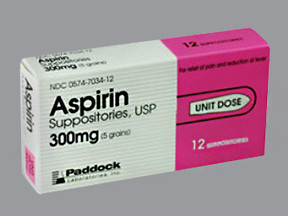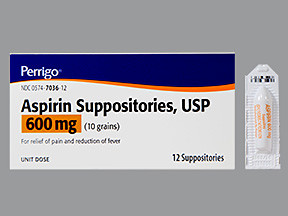ASPIRIN SUPPOSITORY - RECTAL
PHONETIC PRONUNCIATION: (AS-pir-in)
GENERIC NAME(S): aspirin
Uses
USES: This medication is used to reduce fever and relieve minor to moderate pain from conditions such as muscle aches, toothaches, menstrual cramps, arthritis, and headaches. Aspirin is known as a salicylate and a nonsteroidal anti-inflammatory drug (NSAID) that works by blocking a certain natural substance in your body to reduce pain and swelling. Aspirin is also used in low doses as a blood thinner to prevent blood clots after surgery on clogged arteries (e.g., bypass surgery, carotid endarterectomy) and to reduce the risk of stroke or heart attack.
How to use ASPIRIN SUPPOSITORY - RECTAL
HOW TO USE: If you are using this medication for self-treatment, carefully read the product label to make sure this product is correct for you or your child. You should also read the product label to find recommendations on the maximum number of suppositories you can use in a 24-hour period, and the maximum length of self-treatment before seeking medical advice. Talk to your doctor or pharmacist if you have any questions about this medication. If you are using this medication under the instruction of your doctor, use it exactly as prescribed. Apply this medication rectally as directed by your doctor, or, if you are self-treating, follow instructions on the product label. If the suppository is too soft to insert, put it in cold water or refrigerate for 30 minutes before removing the foil wrapper. Unwrap the foil and moisten the suppository with a little water. Lie down on your left side with right knee bent. Insert the suppository into the rectum with your finger. Remain lying down for a few minutes and avoid having a bowel movement for an hour or longer so the drug will be absorbed. The dosage and length of aspirin treatment are based on your medical condition and response to therapy. Consult your doctor before treating a child younger than 12. This medication should not be used for self-treatment of pain for longer than 10 days in adults or 5 days in children. This drug should not be used in adults or children for fever persisting longer than 3 days or for sore throat pain lasting longer than 2 days. No more than 5 doses of this medication should be given to a child for pain or fever in a 24-hour period. Do not use more medication or use it for longer than recommended above unless directed by your doctor. Use the smallest effective dose. Consult your doctor or pharmacist if you have any questions. If you are using this medication for self-treatment of headache, seek immediate medical attention if you also have slurred speech, weakness on one side of the body, or sudden vision changes. Before using this drug, consult a doctor or pharmacist if you have headaches caused by head injury, coughing, or bending, or if you have a headache with persistent/severe vomiting, fever, and stiff neck. If you are using this medication on an as needed basis (not on a regular schedule), remember that pain medications work best if they are used as the first signs of pain occur. If you wait until the pain has significantly worsened, the medicine may not work as well. Consult your doctor if your condition persists or worsens (e.g., new or unusual symptoms, redness/swelling of the painful area, pain/fever that does not go away or gets worse).
Side Effects
Precautions
Interactions
Overdose
Images
Reviews
Faq for ASPIRIN SUPPOSITORY - RECTAL
An aspirin suppository is a form of aspirin medication that is administered rectally. It is a solid dosage form that is inserted into the rectum for systemic absorption.
Using an aspirin suppository allows for a direct route of absorption, often resulting in quicker and more potent effects compared to oral administration. It can be beneficial for individuals who are unable to take medication orally or require fast action.
To use an aspirin suppository, follow the instructions provided by your healthcare provider or the product's packaging. Typically, you will need to lie on your side with one leg bent, gently insert the suppository into your rectum using the applicator provided, and then remain lying down for a few minutes to allow it to dissolve.
Aspirin suppositories are commonly used for relief of pain, inflammation, and fever associated with conditions such as headaches, menstrual cramps, minor injuries, and post-surgical pain. They can also be used as a blood thinner to prevent clot formation.
Common side effects may include rectal irritation or burning sensation, minor bleeding, and allergic reactions. If you experience severe stomach pain, black or bloody stools, or signs of an allergic reaction such as rash, swelling, or difficulty breathing, seek immediate medical attention.
It is important to consult with your healthcare provider before using any medication during pregnancy or while breastfeeding. They can assess the potential benefits and risks for you and suggest alternative options if necessary.
Aspirin suppositories can interact with certain medications, so it is essential to inform your healthcare provider about all the medications, supplements, and herbal products you are currently taking. This will help them determine if there are any potential interactions to be cautious about.
Some aspirin suppositories may have age restrictions. Always read the product label or consult a healthcare professional to ensure it is safe and appropriate to use for yourself or your children.
The dosing frequency and duration of aspirin suppository use will depend on your specific condition and the recommendation of your healthcare provider. It is crucial to follow the prescribed dosage instructions accurately.
Disclaimer
IMPORTANT: HOW TO USE THIS INFORMATION: This is a summary and does NOT have all possible information about this product. This information does not assure that this product is safe, effective, or appropriate for you. This information is not individual medical advice and does not substitute for the advice of your health care professional. Always ask your health care professional for complete information about this product and your specific health needs.


No Reviews Yet